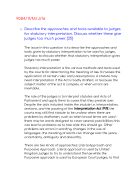Arguably, an absurd result was achieved in Fisher v Bell (the flick-knives case) and in L&NER v Berriman, where a railway worker’s widow was denied compensation on a technicality. However, this line of reasoning has essentially fallen into disrepute and the courts will go to great lengths not to achieve absurd results. The modern approach is to discern the intention or purpose of Parliament - known as the purposive approach - and the courts will go to great lengths to construe a statute in line with the supposed intention. That said, the starting point to interpretation is that judges should, in the words of Lord Reid, ‘look at the natural and ordinary meaning of that word or phrase in its context in the statute’ in interpreting same (Pinner v Everett).
Further, in line with the purposive approach, words in an Act may be added or omitted to give effect to the intentions of Parliament. However, there are strict rules which were laid down in Inco Europe. Here, Lord Nicholls stated that the court must be abundantly sure of the intended purpose of the statute; that by mistake Parliament failed to give effect to that purpose; and, crucially, the substance of the wording that Parliament would have used.
The golden rule was developed in the nineteenth century. Its limits were laid out in Grey v Pearson, where Lord Wensleydale stated: ‘The ordinary sense of the words is to be adhered to, unless it would lead to absurdity, when the ordinary sense may be modified to avoid the absurdity but no further.’ In Adler v George words were added to a statute in order to avoid an absurdity and gain a conviction under the Official Secrets Act 1920.
Heydon’s case in 1582 established the mischief rule. It permits judges to interpret a statute quite widely where the intention of the statute has been to put an end to some mischief. The limits of this rule have never been laid out, though in Jones v Wrotham Park Settled Estates, Lord Diplock laid out three circumstances where it may apply: if it is possible to determine from the Act the precise mischief that the Act was to remedy; if it was an accident that the mischief had not been resolved by the Act’s literal meaning; and if it is possible to say with certainty what additional words would have been inserted by draftsmen and approved by Parliament. The rule was used to gain a conviction under the Street Offences Act 1959 in Smith v Hughes.
how a person is found guilty they use different approaches. These are used in different situations.







